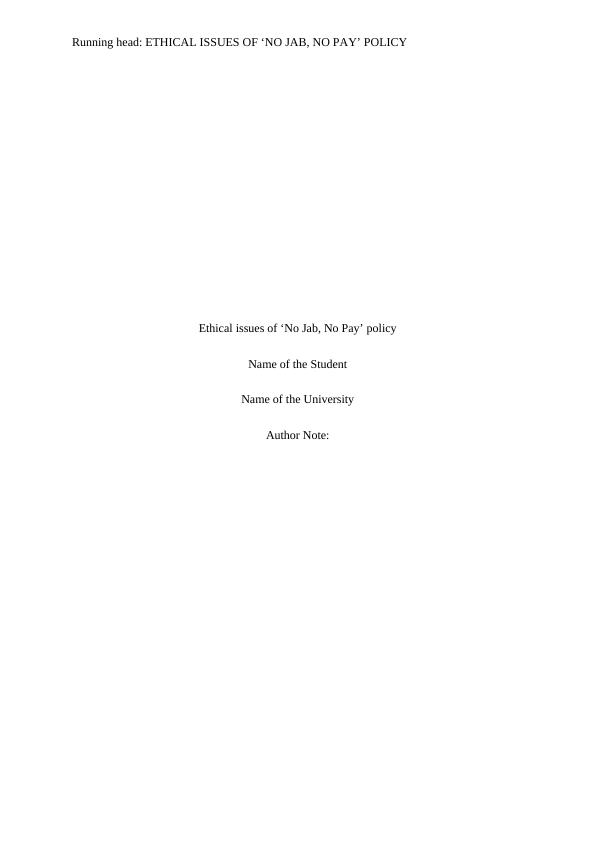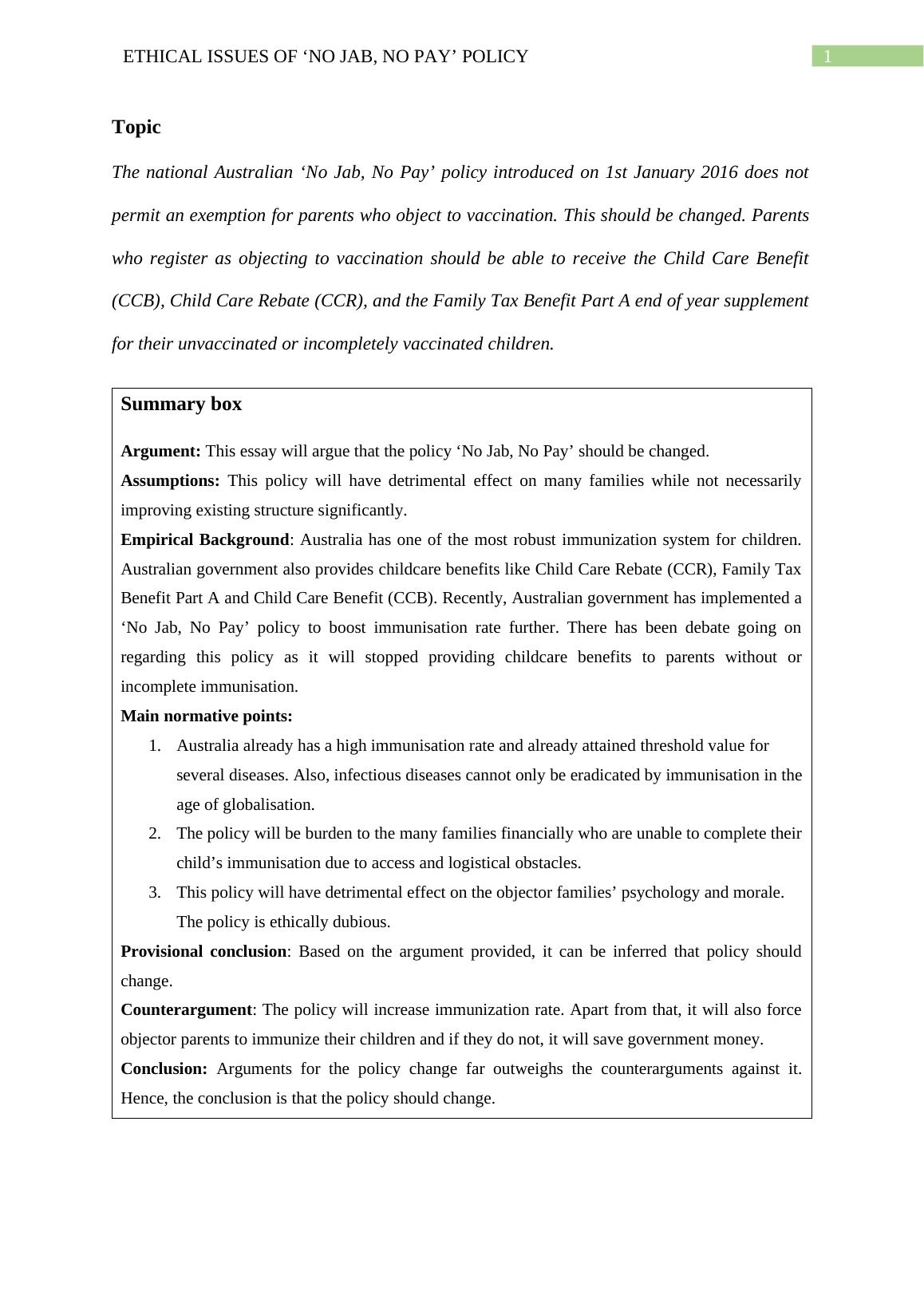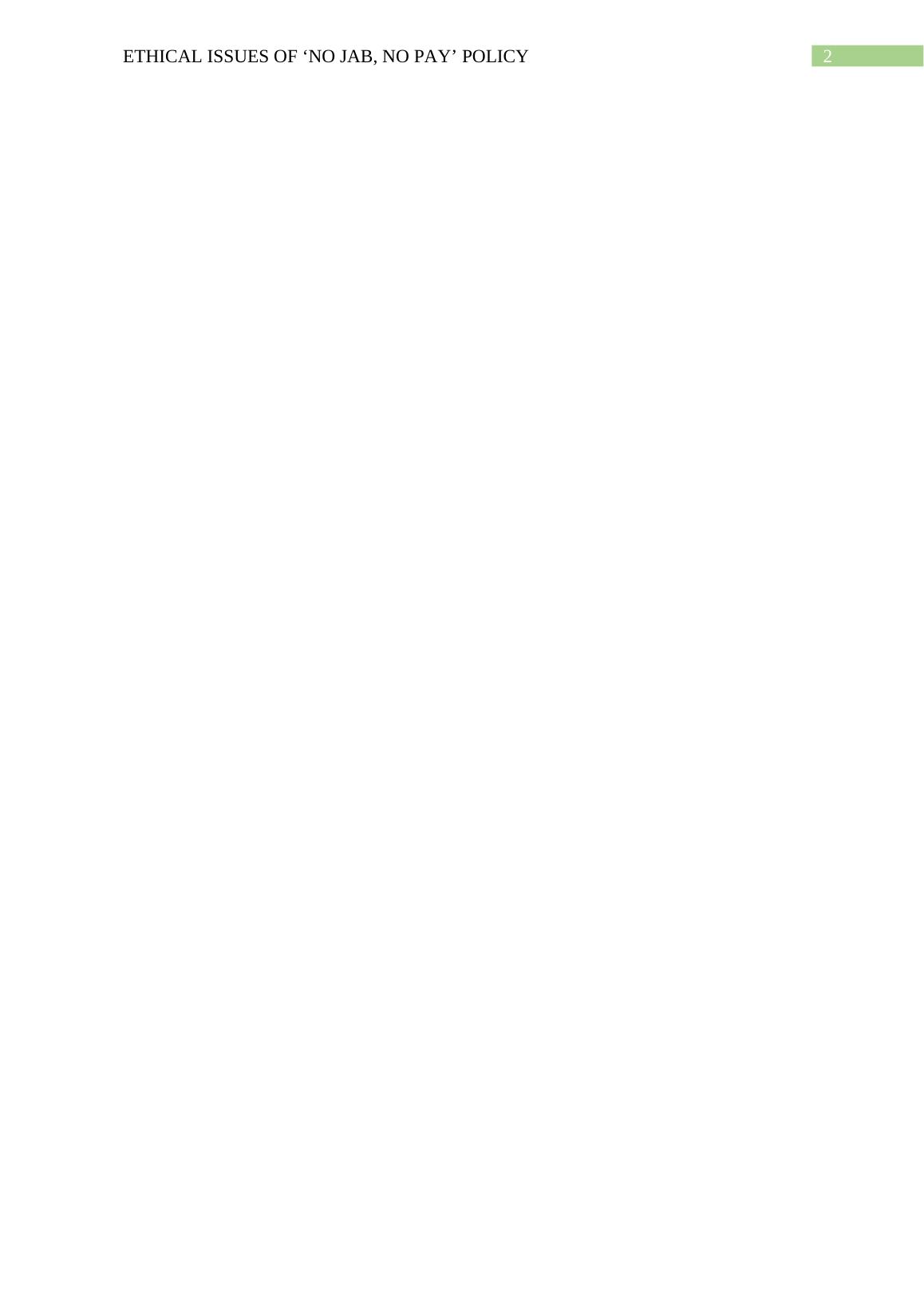Ask a question from expert
(PDF) No Jab, No Job? Ethical Issues
10 Pages2795 Words77 Views
Added on 2021-09-15
(PDF) No Jab, No Job? Ethical Issues
Added on 2021-09-15
BookmarkShareRelated Documents
Running head: ETHICAL ISSUES OF ‘NO JAB, NO PAY’ POLICY
Ethical issues of ‘No Jab, No Pay’ policy
Name of the Student
Name of the University
Author Note:
Ethical issues of ‘No Jab, No Pay’ policy
Name of the Student
Name of the University
Author Note:

ETHICAL ISSUES OF ‘NO JAB, NO PAY’ POLICY1
Topic
The national Australian ‘No Jab, No Pay’ policy introduced on 1st January 2016 does not
permit an exemption for parents who object to vaccination. This should be changed. Parents
who register as objecting to vaccination should be able to receive the Child Care Benefit
(CCB), Child Care Rebate (CCR), and the Family Tax Benefit Part A end of year supplement
for their unvaccinated or incompletely vaccinated children.
Summary box
Argument: This essay will argue that the policy ‘No Jab, No Pay’ should be changed.
Assumptions: This policy will have detrimental effect on many families while not necessarily
improving existing structure significantly.
Empirical Background: Australia has one of the most robust immunization system for children.
Australian government also provides childcare benefits like Child Care Rebate (CCR), Family Tax
Benefit Part A and Child Care Benefit (CCB). Recently, Australian government has implemented a
‘No Jab, No Pay’ policy to boost immunisation rate further. There has been debate going on
regarding this policy as it will stopped providing childcare benefits to parents without or
incomplete immunisation.
Main normative points:
1. Australia already has a high immunisation rate and already attained threshold value for
several diseases. Also, infectious diseases cannot only be eradicated by immunisation in the
age of globalisation.
2. The policy will be burden to the many families financially who are unable to complete their
child’s immunisation due to access and logistical obstacles.
3. This policy will have detrimental effect on the objector families’ psychology and morale.
The policy is ethically dubious.
Provisional conclusion: Based on the argument provided, it can be inferred that policy should
change.
Counterargument: The policy will increase immunization rate. Apart from that, it will also force
objector parents to immunize their children and if they do not, it will save government money.
Conclusion: Arguments for the policy change far outweighs the counterarguments against it.
Hence, the conclusion is that the policy should change.
Topic
The national Australian ‘No Jab, No Pay’ policy introduced on 1st January 2016 does not
permit an exemption for parents who object to vaccination. This should be changed. Parents
who register as objecting to vaccination should be able to receive the Child Care Benefit
(CCB), Child Care Rebate (CCR), and the Family Tax Benefit Part A end of year supplement
for their unvaccinated or incompletely vaccinated children.
Summary box
Argument: This essay will argue that the policy ‘No Jab, No Pay’ should be changed.
Assumptions: This policy will have detrimental effect on many families while not necessarily
improving existing structure significantly.
Empirical Background: Australia has one of the most robust immunization system for children.
Australian government also provides childcare benefits like Child Care Rebate (CCR), Family Tax
Benefit Part A and Child Care Benefit (CCB). Recently, Australian government has implemented a
‘No Jab, No Pay’ policy to boost immunisation rate further. There has been debate going on
regarding this policy as it will stopped providing childcare benefits to parents without or
incomplete immunisation.
Main normative points:
1. Australia already has a high immunisation rate and already attained threshold value for
several diseases. Also, infectious diseases cannot only be eradicated by immunisation in the
age of globalisation.
2. The policy will be burden to the many families financially who are unable to complete their
child’s immunisation due to access and logistical obstacles.
3. This policy will have detrimental effect on the objector families’ psychology and morale.
The policy is ethically dubious.
Provisional conclusion: Based on the argument provided, it can be inferred that policy should
change.
Counterargument: The policy will increase immunization rate. Apart from that, it will also force
objector parents to immunize their children and if they do not, it will save government money.
Conclusion: Arguments for the policy change far outweighs the counterarguments against it.
Hence, the conclusion is that the policy should change.

ETHICAL ISSUES OF ‘NO JAB, NO PAY’ POLICY2
Topic
The national Australian ‘No Jab, No Pay’ policy introduced on 1st January 2016 does not
permit an exemption for parents who object to vaccination. This should be changed. Parents
who register as objecting to vaccination should be able to receive the Child Care Benefit
(CCB), Child Care Rebate (CCR), and the Family Tax Benefit Part A end of year supplement
for their unvaccinated or incompletely vaccinated children.
Argument
This essay will argue for the topic that the new policy ‘No Jab, No, Pay’ implemented
on 1st January, 2016 should be changed and parents with objection to vaccinations should be
able to receive government provided benefits like Child Care Rebate (CCR), Family Tax
Benefit Part A and Child Care Benefit (CCB).
Assumptions
Immunisation rate in Australia is very high at the moment. However, the Australian
government’s recent ‘No Jab, No Pay’ policies to increase this immunisation rate even higher
has some ethical concern. Government is punishing and segmenting people for a decision
which should be free and individual decision. This policy will also harm people financially
who are not against anti-vaccinations but unable to vaccinate their children due to access or
logistical issue. Along with these, unvaccinated children need most support from the
government healthcare system. Thus, it can be assumed that the policy ‘No Jab, No Pay’
should be changed.
Empirical Background
Australia’s immunisation rate is one of the best in the whole world which is close to
93 percent. Almost 90 percent children in Australia become fully immunised before they
reach age five (1). In addition, Australia has a very stern vaccination law which became even
Topic
The national Australian ‘No Jab, No Pay’ policy introduced on 1st January 2016 does not
permit an exemption for parents who object to vaccination. This should be changed. Parents
who register as objecting to vaccination should be able to receive the Child Care Benefit
(CCB), Child Care Rebate (CCR), and the Family Tax Benefit Part A end of year supplement
for their unvaccinated or incompletely vaccinated children.
Argument
This essay will argue for the topic that the new policy ‘No Jab, No, Pay’ implemented
on 1st January, 2016 should be changed and parents with objection to vaccinations should be
able to receive government provided benefits like Child Care Rebate (CCR), Family Tax
Benefit Part A and Child Care Benefit (CCB).
Assumptions
Immunisation rate in Australia is very high at the moment. However, the Australian
government’s recent ‘No Jab, No Pay’ policies to increase this immunisation rate even higher
has some ethical concern. Government is punishing and segmenting people for a decision
which should be free and individual decision. This policy will also harm people financially
who are not against anti-vaccinations but unable to vaccinate their children due to access or
logistical issue. Along with these, unvaccinated children need most support from the
government healthcare system. Thus, it can be assumed that the policy ‘No Jab, No Pay’
should be changed.
Empirical Background
Australia’s immunisation rate is one of the best in the whole world which is close to
93 percent. Almost 90 percent children in Australia become fully immunised before they
reach age five (1). In addition, Australia has a very stern vaccination law which became even

End of preview
Want to access all the pages? Upload your documents or become a member.
Related Documents
No Jab No Pay : Assignmentlg...
|14
|3681
|130
Immunisation rates in Australialg...
|8
|2365
|292
Critical Review on the Health Policy | Reportlg...
|11
|2375
|99
Contemporary Challenges regarding Informed Consent (Doc)lg...
|22
|5419
|63
Linking Immunization Status And Eligibilitylg...
|2
|2153
|27
The Case of Mia Masterson (No 4 Wellbeing street) Promoting mandatory vaccinationlg...
|10
|2630
|295